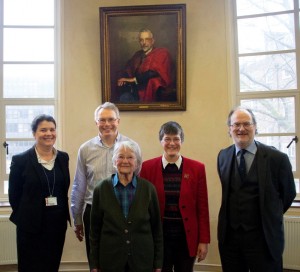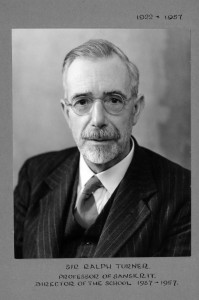SOAS History: Ralph Lilley Turner
In the lead-up to the SOAS Centenary in 2016, we will be taking a look at the history of the School through collections held at SOAS Archives. This week, the School’s Corporate Records Manager & Archivist, Adele Picken, looks at the papers of Ralph Lilley Turner, second Director of the School of Oriental Studies (later School of Oriental & African Studies), 1937-1957.

Family of Ralph Turner (1937-57) in front of his portrait during a visit to SOAS in February 2014. Left back: Susannah Rayner (former Head of Special Collections), the grandchildren of Sir Ralph, siblings Chris Smith Dr Dorothy Ball, and Professor Paul Webley (Director); front row: Mary Ede, Sir Ralph's daughter. © SOAS, University of London
Ralph Lilley Turner was a renowned Indologist and became the second Director of the School of Oriental and African Studies. The Ralph Turner Collection held at SOAS Archives (reference: MS 380710) contains personal correspondence, maps and diaries from Turner’s time in the army during the First World War, and some manuscripts relating to his academic work. There are also photographs of Ralph Turner in the SOAS Picture Archive. SOAS still retains a good relationship with the Turner family.
Ralph Lilley Turner was born in 1888 and educated at the Perse Grammar School where he was first introduced to Sanskrit by the Headmaster, W.H.D. Rouse, to whom he later dedicated his Collected Papers 1912-1973. Turner graduated with a First Class Honours Degree in Classical Tripos and Oriental Languages Tripos from Christ’s College, Cambridge. In 1913, he took up a post as the Indian Educational Service Lecturer in Sanskrit at Queen’s College, Benares, and in 1914 and 1922 he delivered the Wilson Philological Lectures at Bombay University. Between 1915 and 1919, Turner served with the 2nd/3rd Queen Alexandra’s Own Gurkha Rifles in Palestine and India, for which he was awarded the Military Cross. Whilst serving in Allenby’s Palestine Campaign, Turner gained a deep affection for the Gurkhas and became deeply interested in their language which later led him to publish the Comparative and Etymological Dictionary of the Nepali Language in 1931. It was during this campaign, that Turner also wrote down the Gurkha stories of the advance from Gaza to Jerusalem in phonetic transcription with translation and grammatical notes, which he later published as Specimens of Nepāli (Indian Atiquary 1921, 1922) alongside The Infinitive in Nepāli (philological, 1921).
After demobilisation he married Dorothy Rivers Goulty. In 1920 he took up a post as Professor of Indian Linguistics at Benares Hindu University before joining the School of Oriental Studies in 1922 as a Professor of Sanskrit, a position he held until 1954. During his post-war teaching, Turner revolutionised the teaching of modern Indian languages. In 1937, on Denison Ross’ retirement Turner became Director of the School and was knighted in 1950. In 1954, Turner was given the title of Professor Emeritus of Sanskrit by the Senate of the University of London.
From the beginning of his Directorship, Turner was keen to widen the basis of the School’s studies and a grant from the Rockefeller Foundation made it possible to launch a series of research projects in African linguistics which led to the opening of the first department of the languages and cultures of Africa in a British university. In 1938, the School changed its name to the School of Oriental and African Studies. In 1944, Turner was instrumental in generating the appointment of the Scarborough Commission (which was to recommend further provision in British universities for the study of Asia and Africa).
During his twenty years as Director, Turner saw the movement of the School from Finsbury Circus to temporary accommodation in Vandon House, Broadway Court and then to the final site that the School occupies now in Bloomsbury. At the outbreak of the Second World War in 1939, the School also briefly evacuated to temporary lodgings at Christ’s College Cambridge. However, the School quickly returned to London in July 1940 as Turner felt the School needed to be in day to day contact with the Government Departments and with the Library (which had remained in London) in order to make a full contribution to the war effort. It was during this time that the School entered into a long dispute with the Ministry of Information over occupation of the Bloomsbury building, a dispute which SOAS eventually won in 1943.
Turner successfully saw the survival, and growth, of the School through the Second World War. Turner’s first battle was to convince the War Service of the immediate need to train Service cadets in certain languages. Eventually, Turners efforts did work and the demand for intensive language courses grew with nearly 1,000 servicemen entering the School by 1943-1944. The School also provided support to the war effort by undertaking translations for the Postal and Telegraph Censorship Department.
Turner retired in 1957 to be succeeded by Sir Cyril Philips. On retirement, Turner became an Honorary Fellow of the School and received a radio set and a silver cigarette box subscribed to by the members of the common room. In 1966, Turner produced A Comparative Dictionary of the Indo-Aryan Languages (1966), with Indexes by his wife Lady Dorothy Rivers Turner (1969). On 22 April 1983 he sadly passed away at the age of 95.


In 1987 I was lucky enough to buy some of Sir Ralph Turner’s books from a secondhand book shop. These included Brugmann’s “Kurze Vergleichende Grammatik der Indogermanischen Sprachen”, which Turner received as a school prize in 1907 — surely not every schoolboy’s choice! Also the complete multi-volume version of the same work, which he received as the “Rajah of Cochin’s Sanskrit Prize” when he was a student at Christ’s College in 1911.
Fascinating stuff. Thanks for posting.
Thanks for the post. Quite interesting!